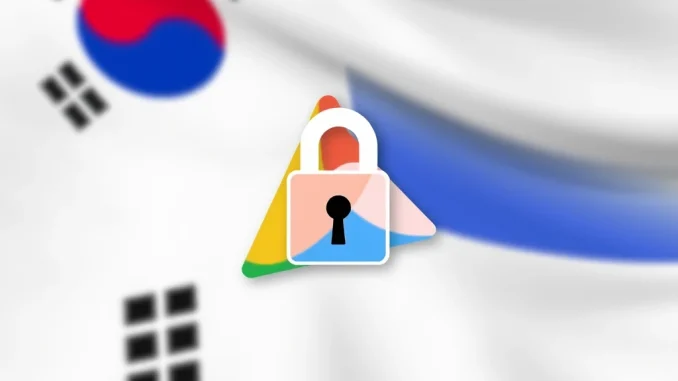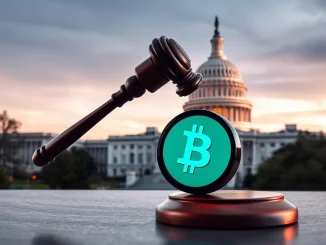
Breaking News for Crypto Users in South Korea! Are you a crypto enthusiast in South Korea using platforms like KuCoin or MEXC? Brace yourselves for a significant update. Google Play Store has just dropped a bombshell, impacting access to several foreign cryptocurrency exchange apps. This move signals a tightening grip on crypto regulations in the region, and it’s crucial to understand what this means for you.
Why is Google Play Blocking Crypto Apps in South Korea?
In a decisive move to enforce crypto regulations, Google Play Store has blocked access to 17 unregistered foreign Virtual Asset Service Provider (VASP) applications in South Korea. Among the affected platforms are prominent names like KuCoin and MEXC. This action, as reported by Asia Business Daily, comes as these platforms were allegedly operating in South Korea without proper registration, targeting Korean users.
The wheels started turning on March 25th when Google, acting on the request of South Korea’s Financial Intelligence Unit (FIU), which operates under the Financial Services Commission (FSC), implemented the ban. This means if you’re in South Korea, you can no longer find, install, or even update these specific apps directly from the Google Play Store. Think of it as a digital border control for crypto apps.

What Does This Mean for KuCoin and MEXC Users in South Korea?
If you are a user of KuCoin or MEXC in South Korea, this change has direct implications:
- No New Installs via Google Play: You cannot download the KuCoin or MEXC apps from the Google Play Store if you haven’t already installed them.
- No App Updates via Google Play: Existing users who downloaded the apps via Google Play will not receive updates through the store. This could potentially lead to security vulnerabilities or missed feature updates down the line.
- Access via Other Means: While Google Play access is blocked, it’s important to note that this block specifically targets the Google Play Store. Users might still be able to access these platforms through their websites or by directly downloading APK files (Android Application Package) from alternative sources. However, proceed with caution when downloading apps from unofficial sources due to potential security risks.
The Bigger Picture: South Korea’s Stance on Crypto Regulations
This move is not an isolated incident but rather a part of South Korea’s broader strategy to tighten its grip on the burgeoning cryptocurrency market. South Korea has been actively working on establishing a robust regulatory framework for digital assets to protect investors and prevent illicit activities.
Here’s a breakdown of what’s driving these stricter crypto regulations:
- Investor Protection: A primary concern for regulators globally, including in South Korea, is safeguarding investors from the volatile nature of crypto markets and potential scams. Unregistered platforms pose a higher risk as they operate outside the legal and supervisory framework.
- Combating Money Laundering: Cryptocurrencies have been flagged as potential tools for money laundering and illicit financing. Regulating VASPs is seen as crucial to preventing the misuse of digital assets for illegal activities.
- Tax Compliance: Governments worldwide are looking to bring cryptocurrency transactions into the tax net. Regulated exchanges facilitate better tracking and reporting of crypto-related income.
- Maintaining Financial Stability: As the crypto market grows, its potential impact on the traditional financial system increases. Regulations are aimed at ensuring financial stability and preventing systemic risks.
Is This the End for Foreign Crypto Exchanges in South Korea?
Not necessarily. The block on Google Play is a significant hurdle, but it’s not a complete ban on these platforms operating in South Korea. It’s more accurately described as a strong regulatory nudge. Here’s what foreign VASPs need to do:
- Registration is Key: The core issue is the lack of registration with South Korean authorities. Foreign VASPs targeting Korean users must comply with local regulations and register with the relevant bodies, like the FIU.
- Compliance with KYC/AML: This includes implementing robust Know Your Customer (KYC) and Anti-Money Laundering (AML) procedures, which are standard requirements for financial institutions globally.
- Transparency and Reporting: Registered VASPs are expected to be transparent in their operations and comply with reporting requirements to regulatory authorities.
For platforms like KuCoin and MEXC, the path forward involves engaging with South Korean regulators, understanding the specific requirements for registration, and taking concrete steps to comply. It’s a clear message: operate within the rules or face restrictions.
What Should South Korean Crypto Users Do?
If you are a crypto user in South Korea, particularly one who uses the affected platforms, here’s some actionable advice:
- Stay Informed: Keep abreast of regulatory developments in South Korea’s crypto space. Follow reputable crypto news sources and official announcements from regulatory bodies.
- Consider Registered Exchanges: Explore using cryptocurrency exchanges that are officially registered and compliant with South Korean regulations. This offers a safer and more secure environment for your crypto activities.
- Exercise Caution with Unofficial App Sources: While you might find APKs for blocked apps from third-party websites, be extremely cautious. These sources may harbor malware or compromise your security.
- Understand Platform Policies: Pay attention to announcements from KuCoin, MEXC, and other affected platforms regarding their response to these regulations and any changes in service for South Korean users.
Looking Ahead: The Future of Crypto in South Korea
The Google Play block is a clear indicator that South Korea is serious about regulating its cryptocurrency market. This move could potentially set a precedent for other countries considering stricter measures against unregistered foreign crypto platforms. While it might seem like a setback for accessibility, it’s arguably a necessary step towards creating a more regulated, secure, and sustainable crypto ecosystem in South Korea in the long run.
The message is loud and clear: for crypto to thrive responsibly, it must operate within established legal frameworks. For users, it’s a reminder to prioritize security, compliance, and informed decision-making in the ever-evolving world of digital assets.



